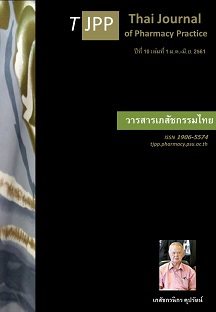ผลการบริบาลทางเภสัชกรรมในผู้ป่วยนอกโรคสมองเสื่อม: การศึกษานำร่อง
Main Article Content
บทคัดย่อ
วัตถุประสงค์: เพื่อศึกษาผลการบริบาลทางเภสัชกรรมต่อปัญหาการใช้ยาในผู้ป่วยโรคสมองเสื่อม และศึกษาความรู้เรื่องโรคและยา คุณภาพชีวิต และความรู้สึกเป็นภาระของผู้ดูแล วิธีการ: การวิจัยนี้เป็นการศึกษาแบบกึ่งทดลองที่วัดผลก่อน-หลัง กลุ่มตัวอย่างคือ ผู้ป่วยโรคสมองเสื่อมและผู้ดูแล กลุ่มละ 12 ราย ที่มารับการบริการที่คลินิกลีลาวดี โรงพยาบาลมหาสารคาม ระหว่างเดือนสิงหาคมถึงธันวาคม 2559 ผู้วิจัยค้นหาและแก้ไขปัญหาด้านยาในผู้ป่วยแต่ละรายจำนวน 3 ครั้ง (ในวันที่ 1 วันที่ 30 และ วันที่ 90) และให้ความรู้เรื่องโรค ยา และวิธีการดูแลผู้ป่วยเบื้องต้น ร่วมกับการให้คู่มือการดูแลผู้ป่วยโรคสมองเสื่อมแก่ผู้ดูแล ผลการวิจัย: ผู้ป่วยโรคสมองเสื่อมส่วนใหญ่เป็นผู้สูงอายุเพศหญิง (ร้อยละ 58.3) อายุเฉลี่ย 72.9±12.7 ปี เมื่อเปรียบเทียบก่อนและหลังการบริบาลทางเภสัชกรรม (เดือนที่ 3) ปัญหาด้านการใช้ยาเฉลี่ยลดลงอย่างมีนัยสำคัญทางสถิติ จาก 0.83±0.72 ปัญหาต่อราย เหลือ 0.25±0.45 ปัญหาต่อราย (P=0.038) ปัญหาที่สามารถแก้ไขได้ร้อยละ 100 คือ ผู้ป่วยไม่ให้ความร่วมมือในการใช้ยา ผู้ป่วยไม่ได้ยาที่ควรจะได้ และผู้ป่วยได้รับยาที่ถูกต้องแต่ขนาดยาน้อยเกินไป สำหรับปัญหาด้านการเกิดอาการไม่พึงประสงค์ลดลงร้อยละ 50 ผู้ดูแลผู้ป่วยโรคสมองเสื่อมส่วนใหญ่เป็นเพศหญิง (ร้อยละ 75.0) อายุเฉลี่ย 46.2±9.0 ปี ส่วนใหญ่เกี่ยวข้องเป็นบุตร (ร้อยละ 66.7) เมื่อเปรียบเทียบคะแนนความรู้ก่อนและหลังการได้รับความรู้และการได้รับคู่มือจากผู้วิจัย พบว่า คะแนนความรู้เกี่ยวกับโรคและยาเพิ่มขึ้นอย่างมีนัยสำคัญทางสถิติ (9.1±3.6 และ 12.6±3.7 คะแนน ตามลำดับ, P=0.001) จากคะแนนเต็ม 20 คะแนน คุณภาพชีวิตและความรู้สึกเป็นภาระของผู้ดูแลมีแนวโน้มที่ดีขึ้นแต่ไม่แตกต่างอย่างมีนัยสำคัญ สรุป: การให้การบริบาลทางเภสัชกรรมสามารถลดปัญหาจากการใช้ยาในผู้ป่วยโรคสมองเสื่อม ส่วนการให้ความรู้เรื่องโรคและยา และการแจกคู่มือสามารถเพิ่มความรู้ความเข้าใจเกี่ยวกับโรคและยาในผู้ดูแลผู้ป่วยโรคสมองเสื่อมอย่างมีนัยสำคัญ
Article Details
ผลการวิจัยและความคิดเห็นที่ปรากฏในบทความถือเป็นความคิดเห็นและอยู่ในความรับผิดชอบของผู้นิพนธ์ มิใช่ความเห็นหรือความรับผิดชอบของกองบรรณาธิการ หรือคณะเภสัชศาสตร์ มหาวิทยาลัยสงขลานครินทร์ ทั้งนี้ไม่รวมความผิดพลาดอันเกิดจากการพิมพ์ บทความที่ได้รับการเผยแพร่โดยวารสารเภสัชกรรมไทยถือเป็นสิทธิ์ของวารสารฯ
เอกสารอ้างอิง
2. Korolev IO. Alzheimer’s disease: A clinical and basic science review. MSRJ 2014; 4: 24-33.
3. Alzheimer's Disease International. Policy brief for G8 heads of government. The global impact of dementia 2013-2050. London: Alzheimer's disease International; 2013.
4. World Health Organization. The epidemiology and impact of dementia current state and future trends. 2015.
5. National Health Examination Survey Office, Health Systems Research Institute. Dementia survey in elderly people in Thai population health survey by interview and physical examination No.4. 2008.
6. Mekawichai P, Saetang S. Caregiver burden among Thai dementia patients’ caregivers. Journal of Psychiatrist Association of Thailand 2013; 58: 101-10.
7. Rungruang K, Kanchnasilp J, Ploylearmsang C, Dudsadeeprasert J. Pharmaceutical care in outpa- tients with dementia at Nakhon Ratchasima Raja- nagarinda psychiatric hospital. Isan Journal of Pharmaceutical Sciences 2011; 7: 62-75.
8. Stahl SM, Markowitz JS, Papadopoulos G, Sadik K Examination of nighttime sleep-related problems during double-blind, placebo-controlled trials of galantamine in patients with Alzheimer's disease. Curr Med Res Opin 2004;20:517-24.
9. Cummings J, Froelich L, Black SE, Bakchine S, Bellelli G, Molinuevo JL, et al. Randomized, double-blind, parallel-group, 48-week study for efficacy and safety of a higher-dose rivastigmine patch (15 vs. 10 cm2) in Alzheimer’s disease. Dement Geriatr Cogn Disord 2012;33:341-53.
10. Brady R, Weinman J. Adherence to cholinesterase inhibitors in Alzheimer's disease: A review. Dement Geriatr Cogn Disord 2013;35:351-63.
11. Charernboon T. Treatment outcomes of dementia : A prospective study in Thammasat University hospital. Journal of the Psychiatric Association of Thailand 2014;59:313-22.
12. Siripornpoka P, Sudyajai P. Impact of pharmaceu- tical care in patients with Alzheimer’s [undergrad- uate project]. Bangkok: Mahidol University. 2007.
13. Mahatnirunkhun S, Tuntipiwatthanasakhun W, Phoompaisan W. World Health Organization Quality of Life Brief-Thai (WHOQOL–BREF–THAI). Chiangmai: Suan Prung hospital; 2002.
14. Toonsiri C, Sunsern R, Lawang W. Development of the burden interview for caregivers of patients with chronic illness. Journal of Nursing and Education. 2011; 4: 62-75.
15. Hanrinth R. Classification for drug related problems. Thai Journal of Pharmacy Practice 2009 ; 1: 84-96.
16. Visetkit N, Limwongsuwan. Pharmaceutical care in demented patients. [undergraduate project] Bangkok : Mahidol University. 2006.
17. Viña J, Lloret A. Why women have more Alzheimer's disease than men: gender and mitochondrial toxicity of amyloid-β peptide. J Alzheimers Dis 2010;20:S527-33.
18. Mazure CM, Swendsen J. Sex differences in Alzheimer’s disease and other dementias. Lancet Neurol 2016;15:451-2.
19. Teng E, Ringman JM, Ross LK, Mulnard RA, Dick MB, Bartzokis G, et al. Diagnosing depression in Alzheimer disease with the National Institute of Mental Health Provisional Criteria. Am J Geriatr Psychiatry 2008;16:469-77.
20. Duthie A, Chew D, Soiza RL. Non-psychiatric comorbidity associated with Alzheimer’s disease. QJM 2011;104:913-20.
21. Utsawutmslangkhun T, Chaikhom C, Boonyaphat N. Quality of life of dementia caregivers and results after providing pharmaceutical care. Journal of the Department of Medical Services. 2015; 40: 66-73.
22. Ory MG, Hoffman RR 3rd, Yee JL, Tennstedt S, Schulz R. Prevalence and impact of caregiving: A detailed comparison between dementia and nondementia caregivers. Gerontol 1999;39:177-86.
23. Moore MJ, Zhu CW, Clipp EC. Informal costs of dementia care: estimates from the National Longitudinal Caregiver Study. J Gerontol B Psychol Sci Soc Sci 2001;56:S219-28.
24. Chanpen Suttichaichot, SK, Wattanaporn Piboonarluk. The effect of motation enhancement program in schizophrenia patients on medication adherence behaviors, Somdet Chaopraya Institute of Psychiatry. J Psychiatr Nurs Ment Health 2013; 27: 75-86.
25. León-Salas B, Olazarán J, Muñiz R, González-Salvador MT, Martínez-Martín P. Caregivers’ estimation of patients’ quality of life (QoL) in Alzheimer's disease (AD): An approach using the ADRQL. Arch Gerontol Geriatr 2011;53: 13-8.
26. Yesufu-Udechuku A, Harrison B, Mayo-Wilson E, Young N, Woodhams P, Shiers D, et al. Interventions to improve the experience of caring for people with severe mental illness: systematic review and meta-analysis. Br J Psychiatry 2015; 206: 268-74.
27. Martín-Carrasco M, Ballesteros-Rodríguez J, Domínguez-Panchón AI, Muñoz-Hermoso P, González-Fraile E. Interventions for caregivers of patients with dementia. Actas Esp Psiquiatr 2014; 42: 300-14.


